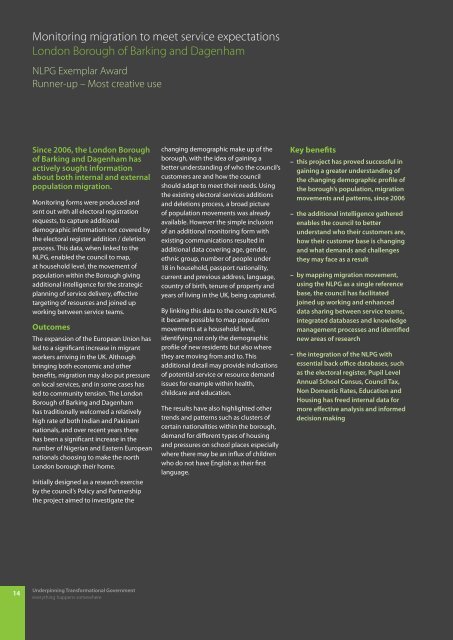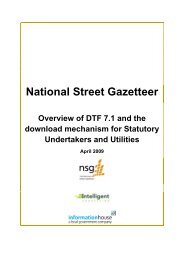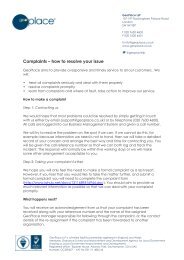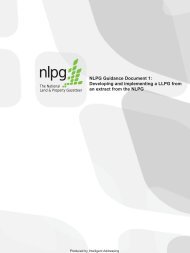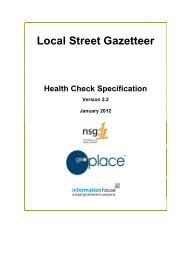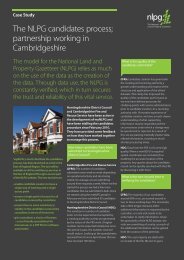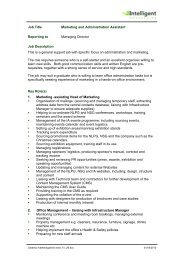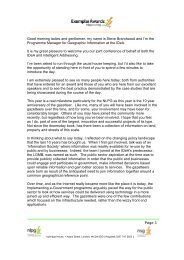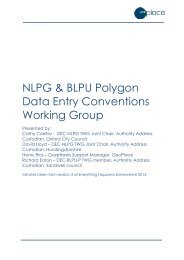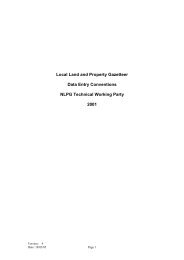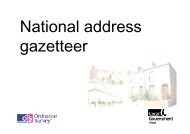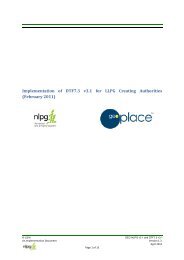Monitoring migration to meet service expectations ... - Iahub.net
Monitoring migration to meet service expectations ... - Iahub.net
Monitoring migration to meet service expectations ... - Iahub.net
You also want an ePaper? Increase the reach of your titles
YUMPU automatically turns print PDFs into web optimized ePapers that Google loves.
<strong>Moni<strong>to</strong>ring</strong> <strong>migration</strong> <strong>to</strong> <strong>meet</strong> <strong>service</strong> <strong>expectations</strong><br />
London Borough of Barking and Dagenham<br />
NLPG Exemplar Award<br />
Runner-up – Most creative use<br />
Since 2006, the London Borough<br />
of Barking and Dagenham has<br />
actively sought information<br />
about both internal and external<br />
population <strong>migration</strong>.<br />
<strong>Moni<strong>to</strong>ring</strong> forms were produced and<br />
sent out with all elec<strong>to</strong>ral registration<br />
requests, <strong>to</strong> capture additional<br />
demographic information not covered by<br />
the elec<strong>to</strong>ral register addition / deletion<br />
process. This data, when linked <strong>to</strong> the<br />
NLPG, enabled the council <strong>to</strong> map,<br />
at household level, the movement of<br />
population within the Borough giving<br />
additional intelligence for the strategic<br />
planning of <strong>service</strong> delivery, effective<br />
targeting of resources and joined up<br />
working between <strong>service</strong> teams.<br />
Outcomes<br />
The expansion of the European Union has<br />
led <strong>to</strong> a significant increase in migrant<br />
workers arriving in the UK. Although<br />
bringing both economic and other<br />
benefits, <strong>migration</strong> may also put pressure<br />
on local <strong>service</strong>s, and in some cases has<br />
led <strong>to</strong> community tension. The London<br />
Borough of Barking and Dagenham<br />
has traditionally welcomed a relatively<br />
high rate of both Indian and Pakistani<br />
nationals, and over recent years there<br />
has been a significant increase in the<br />
number of Nigerian and Eastern European<br />
nationals choosing <strong>to</strong> make the north<br />
London borough their home.<br />
Initially designed as a research exercise<br />
by the council’s Policy and Partnership<br />
the project aimed <strong>to</strong> investigate the<br />
changing demographic make up of the<br />
borough, with the idea of gaining a<br />
better understanding of who the council’s<br />
cus<strong>to</strong>mers are and how the council<br />
should adapt <strong>to</strong> <strong>meet</strong> their needs. Using<br />
the existing elec<strong>to</strong>ral <strong>service</strong>s additions<br />
and deletions process, a broad picture<br />
of population movements was already<br />
available. However the simple inclusion<br />
of an additional moni<strong>to</strong>ring form with<br />
existing communications resulted in<br />
additional data covering age, gender,<br />
ethnic group, number of people under<br />
18 in household, passport nationality,<br />
current and previous address, language,<br />
country of birth, tenure of property and<br />
years of living in the UK, being captured.<br />
By linking this data <strong>to</strong> the council’s NLPG<br />
it became possible <strong>to</strong> map population<br />
movements at a household level,<br />
identifying not only the demographic<br />
profile of new residents but also where<br />
they are moving from and <strong>to</strong>. This<br />
additional detail may provide indications<br />
of potential <strong>service</strong> or resource demand<br />
issues for example within health,<br />
childcare and education.<br />
The results have also highlighted other<br />
trends and patterns such as clusters of<br />
certain nationalities within the borough,<br />
demand for different types of housing<br />
and pressures on school places especially<br />
where there may be an influx of children<br />
who do not have English as their first<br />
language.<br />
Key benefits<br />
– this project has proved successful in<br />
gaining a greater understanding of<br />
the changing demographic profile of<br />
the borough’s population, <strong>migration</strong><br />
movements and patterns, since 2006<br />
– the additional intelligence gathered<br />
enables the council <strong>to</strong> better<br />
understand who their cus<strong>to</strong>mers are,<br />
how their cus<strong>to</strong>mer base is changing<br />
and what demands and challenges<br />
they may face as a result<br />
– by mapping <strong>migration</strong> movement,<br />
using the NLPG as a single reference<br />
base, the council has facilitated<br />
joined up working and enhanced<br />
data sharing between <strong>service</strong> teams,<br />
integrated databases and knowledge<br />
management processes and identified<br />
new areas of research<br />
– the integration of the NLPG with<br />
essential back office databases, such<br />
as the elec<strong>to</strong>ral register, Pupil Level<br />
Annual School Census, Council Tax,<br />
Non Domestic Rates, Education and<br />
Housing has freed internal data for<br />
more effective analysis and informed<br />
decision making<br />
14<br />
Underpinning Transformational Government<br />
everything happens somewhere
London Borough of Barking and Dagenham<br />
Best value<br />
Climate change and sustainability<br />
Community cohesion<br />
Community empowerment and engagement<br />
Community safety<br />
Connecting with communities<br />
Cus<strong>to</strong>mer focus<br />
Culture and sport<br />
Efficiency<br />
Equality and diversity<br />
Evidence of financial savings<br />
Fire and rescue<br />
Healthy communities<br />
Improvement policy<br />
Innovation<br />
Joining up <strong>service</strong> provision<br />
Knowledge management<br />
Local area agreements and local strategic partnerships<br />
Local government reorganisation<br />
Migration programme<br />
Partnership working<br />
Performance management<br />
Rural knowledge<br />
Transformation<br />
•<br />
•<br />
•<br />
•<br />
•<br />
•<br />
•<br />
•<br />
15


